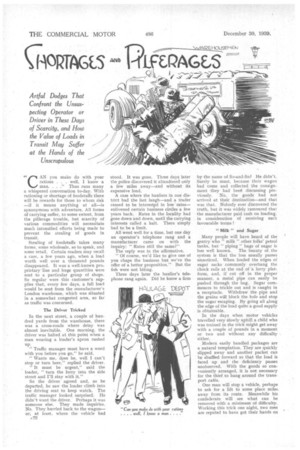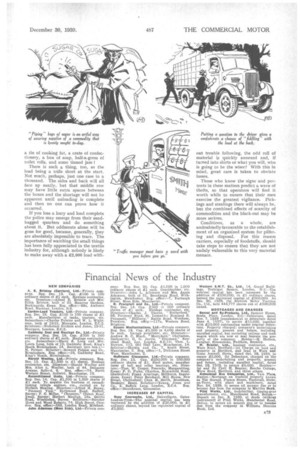CHORTAGES AN° IIIPAGE0S
Page 24

Page 25

If you've noticed an error in this article please click here to report it so we can fix it.
71*
' A—EHOUSEmut\I
Artful Dodges That Confront the Unsuspecting Operator or Driver in These. Days of Scarcity, and How the Value of Loads in Transit May Suffer at the Hands of the Unscrupulous
" AN you make do with your man. . . ." Thus runs many a whispered conversation to-day. With rationing or shortage of foodstuffs there will be rewards for those to whom risk —if it means anything at all—is synonymous with adventure. All forms of carrying suffer, to some extent, from the pilferage trouble, but scarcity of various commodities will necessitate much intensified efforts being made to prevent the stealing of goods in transit.
Stealing of foodstuffs takes many forms, some wholesale, so to speak, and some retail. Certain readers may recall a case, a few years ago, when a load worth well over a thousand pounds
disappeared. It was a well-known proprietary-line and huge quantities were
sent to a particular group of shops. So regular were this customer's supplies that, every few days, a full load would be sent from the manufacturer's London warehouse, which was situated in a somewhat congested area, so far as traffic was concerned.
The Driver Tricked In the next street, a couple of hundred yards from the warehouse, there was a cross-roads where delay was almost inevitable. One morning, the driver was halted at this point when a man wearing a loader's apron rushed up.
" Traffic manager must have a word with you before you go," he said.
" Wants me, does he, well I can't stop or turn here," replied the driver.
" It must be urgent," said the loader, " turn the lorry into the side street and I'll stay with it."
So the driver agreed and, as he departed, he saw the loader climb into the driving seat to keep watch. The traffic manager looked surprised. He didn't want the driver. Perhaps it was someone else, They made inquiries. No. They hurried hack to the wagon— or, at least, where the vehicle had A 22 stood. It was gone. Three days later the police discovered it abandoned only a few miles away—and without its expensive load.
A case where the hauliers in one district had the last laugh—and a trader ceased to be interested in low rates— enlivened certain business circles a few years back. Rates in the locality had gone down and down, until the carrying interests called a halt. There simply had to be a limit.
All went well for a time, but one day an operator's telephone rang and a manufacturer came on with the inquiry: " Rates still the same?"
The reply was in the affirmative.
" Of course, we'd like to give one of you chaps the business but we've the offer of a better proposition," But the fish were not biting.
Three days later the haulier's telephone rang again. Did he know a firm by the name of So-and-So? He didn't. Surely he must, because their wagon had come and collected the consignment they had beeff discussing previously. No, the goods had not arrived at their destination—and that was that. Nobody ever discovered the truth, but it was widely rumoured that the manufacturer paid cash on loading, in consideration of receiving such favourable terms I " Milk " and Sugar Many people will have heard of the gentry who " milk " other folks' petrol tanks, but " piping " bags of sugar is less well known. The beauty of. the system is that the loss usually passes unnoticed. When loaded the edges of sugar sacks commonly overhang the chock rails at the end of a lorry platform, and, if cut off in the proper manner, a metal pipe can easily be pushed through the bag. Sugar commences to trickle out and is caught in a receptacle. Withdraw the pipe and the grains will block the hole and stop the sugar escaping. By going all along the edge of the load quite a good supply is obtainable, In the days when motor vehicles travelled very slowly uphill a child who was trained in the trick might get away with a couple of pounds in a moment or two and without any difficulty either.
Modern easily handled packages are a natural temptation. They are quickly slipped away and another packet can be shuffled forward so that the load is faced up and the deficiency passes unobserved. With the goods so conveniently arranged, it is not necessary for the thief to hang around the transport cafés. One man will stop a vehicle, perhaps to ask for a lift to some place miles away from its route. Meanwhile his confederate will see what can be removed with a minimum of difficulty. Working this trick one night, two men are reputed to have got their hands on
a tin of cooking fat, a crate of confectionery, a box of soap, half-a-gross of toilet rolls, and some tinned jam I There is such a thing, too, as the load being a trifle short at the start. Not much, perhaps, just one case in a thousand. The sides and back will all face up neatly, but that middle row may have little extra spaces between the boxes and the Shortage will not be apparent until unloading is complete and then no one can prove how it occurred.
If you lose a lorry and load complete the police may emerge from their sandbagged quarters and do something about it. But oddments alone will be gone for good, because, generally, they are absolutely impossible to trace. The importance of watching the small things has been fully appreciated in the textile industry for, although nobody is likely to make away with a £2,000 load with
out trouble following, the odd roll of material is quickly annexed and, if turned into shirts or what you will, who is going to be the wiser? With this in mind, great care is taken to obviate losses.
Those who know the signs and portents in these matters predict a wave of thefts, so that operators will And it worth while to ensure that their men exercise the greatest vigilance. Pickings and stealings there will always be, but the combined effects of scarcity of commodities and the black-out may be more serious.
Conditions, as a whole, are undoubtedly favourable to the establishment of an organized system for pilfering and disposal. For this reason carriers, especially of foodstuffs, should take steps to ensure that they are not unduly vulnerable to this very material menace.




















































